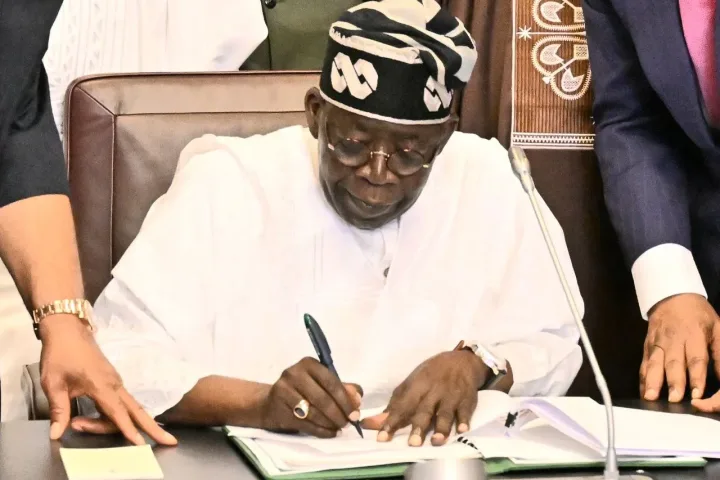Dr Muda Yusuf of the Centre for the Promotion of Private Enterprise (CPPE), in this article, presents the economic and business environment review for 2021 and sets agenda for policy makers for 2022.

Macroeconomic Environmental
The macro-economic condition is a very important component of the business environment as it impacts a great deal on investors confidence. It has implications for costs, profits, competitiveness and the sustainability of investments. This review focusses on four key macroeconomic variables: inflation, foreign exchange, GDP growth, and balance of trade.
Inflation
As at January this year, headline inflation was 16.47% and rose to a peak of 18.17% in march and decelerated incrementally to 15.40% in November 2021. However, headline inflation has been on the increase on a month on month basis from January to date, albeit at a reducing rate. Meanwhile, food inflation has been consistently higher than headline inflation and core inflation for most part of the year.
Inflationary pressure remains a major cause for worry both for businesses and the households as it remains elevated.
Inflation has been fuelled by the following factors in 2021:
i. The structural constraints which inhibited productivity in the economy. This includes challenges of infrastructure, especially power, transportation, logistics etc.
ii. The growing insecurity which is affecting agricultural output in practically all parts of the country. Agricultural activities have been made difficult and almost impossible by the growing insecurity in many parts of the country.
iii. Climate change which includes desertification and flooding which has also taken its toll on agricultural outputs.
iv. Low productivity in agriculture resulting from low technological application and low mechanisation of agriculture. Most farming activities are still being done using the traditional methods hoes and cutlasses.
v. Monetisation of fiscal deficit which has been creating high powered money in the economy. As at the last count Central Banks exposure to the federal government through Ways and Means has been reported to be currently in excess of ten trillion naira.
vi. Sharp depreciation of the Naira exchange rate leading to high cost of raw materials, inputs, equipment and some imported finished goods. This has very serious implications for cost and for the welfare of the people during the year.
Implications of the high inflationary pressures for both the economy and the citizens:
i. Aggravation of poverty as access to food becomes difficult.
ii. Increasing risk of malnutrition which has a negative impact on human capital development.
iii. It increases social tension and fuels criminality.
The implications of inflationary pressures for businesses are as follows: weak purchasing power, low sales and low profit margin, low-capacity utilisation, high production and operating cost, high risk of increased business mortality.
Tackling Inflation
In order to tackle inflation, we need to address the key drivers of inflation in 2022 as follows:
i. Boost productivity in the economy to drive output growth.
ii. Stem the depreciation of the naira exchange rate.
iii. Address the illiquidity in the foreign exchange market.
iv. Minimise the monetisation of fiscal deficit. CBN financing of deficit should be strictly limited to statutory threshold spelt out in the CBN Act.
v. Government should seek creative ways of addressing insecurity in order to pave way for farmers to return to their farms.
vi. We need to address cost of logistics.
vii. We need to address the ease of cargo clearing at the port.
viii. We need to address climate change concerns.
ix. We need to review our trade policy to bring down the cost of some intermediate products for manufacturers.
GDP GROWTH
The economy witnessed four consecutive quarters of GDP growth since the exit from recession in fourth quarter of 2020. There was a GDP growth of 0.51%, in the first quarter; 5.01% in second quarter; and 4.03% in the third quarter of 2021. These were indications that the economy is on recovery path. These could be attributed to the following:
i. Rebound of domestic economic activities following the relaxation of restrictions on economic activities and movement within the country.
ii. Revitalization of sectors that were earlier on lockdown following the onset of the Covid-19 pandemic such as the hospitality, entertainment, aviation, road transportation, tourism, among others.
iii. The restoration of supply chains that were disrupted at the inception of the pandemic.
iv. Recovery of the global economy following improvements in investors sentiments as a result of improved vaccination in many parts of the world.
v. Rebound of commodity prices which had a positive impact on macro-economic outlook. Crude oil price for instance has recorded an impressive recovery in last couple of months.
vi. Base effect as a comparative benchmark for the computation of GDP was period of recession.
vii. Economic stimulus programmes by monetary and fiscal authorities.
However, for the recovery to be sustained, it is important to create an enabling environment for positive investor sentiments in the economy. This should be driven by policy, regulation, macroeconomic conditions, and security of life and property.
BALANCE OF TRADE
The trade balance was in a deficit of N3 trillion in the third quarter of this year, which was an increase of 26.5% on year on year comparative analysis. This is not remarkably different from the trend in previous quarters.
The fundamental issues remain the over dependence on oil and gas for our export earnings. The huge import bill on petroleum products and the weak competitiveness of the non-oil economy were major contributory factors to the unfavourable balance of trade position. To fix the balance of trade position, we need to address the following:
i. Give exporters unfettered and unconditional access to their foreign exchange.
ii. We need to create a fast track for exporters at the ports. If we can have fast track for imports, it is even more imperative that we have a fast track for export. Meanwhile, export processes remain very frustrating at our ports. The shipping companies and the terminal operators do not accord the desired priority to export. This should change.
iii. We should provide access to intermediate inputs on concessionary terms to exporters in order to make their exports competitive both in quality and on price.
iv. We should setup export clusters and deepen the activities of our export processing zones in order to boost export earnings.
v. We need to connect to global value chains based on our competitive advantage.
vi. Terminal operators and shipping companies should be compelled to prioritise export. For most of them, export is not in serious reckoning in their operations.
REFORM OF THE OIL AND GAS SECTOR
The conception of the Petroleum Industry Act was a major step towards the reform of the oil gas sector. It promises to transform the sector through the creation of a legal and regulatory framework that would inspire much higher levels of investors’ confidence. Though late in coming, the reform initiative will change the investment landscape in the sector for the better. The impact on the oil and gas outlook is positive.
INVESTMENT CLIMATE ISSUES; IMPOSITION OF EXCISE DUTY
This proposal by the Federal Ministry of Finance to reintroduce excise duty on carbonated drinks is ill-timed and most inappropriate given the prevailing harsh economic and business conditions. The citizens and the business community are already experiencing a galloping and volatile inflationary condition.
The reintroduction of excise duty is also a negation of the economic recovery, job creation and poverty reduction aspirations of the federal government. Many upcoming small businesses in the beverage sector would be hard hit by this proposal. The millions of micro enterprises in the soft drinks’ fruit juice distribution chain will be adversely impacted by the imposition of the excise tax.
Nigerian manufacturing companies, and indeed most investors, are going through tremendous stress at the moment. They are currently grappling with serious macro-economic challenges and structural constraints impacting on capacity utilization, productivity and competitiveness. This is affecting sales, turnover, profitability, shareholder value and the sustainability of investments. The norm globally at this time is to provide incentives for industries to aid their recovery from the shocks of the pandemic and escalating costs. We cannot afford to be doing the exact opposite. Manufacturers, across all product segments need a respite, especially in the light of the unprecedented escalation of production and operating costs.
Cargo Clearing Process at the Ports
There is an urgent need to ease the cargo clearing processes at our ports. This is a major component of ease of doing business to which government has expressed commitment. We need to do this through the following:
1. Reduce the number of agencies involved in cargo clearing at our ports.
2. We need to deploy technology to aid the customs clearing process, the use of scanner is particularly very important. It is a sad commentary that the largest economy in Africa has been examining cargo and containers physically and manually for the past few years. The effect of this on the cost of import has been humongous. The interest payment on the import, demurrage charges arising from delays, the extra charges by shipping companies, the additional charges by the truck drivers all of these have put a lot of burden on cost on investors and citizens.
3. We should expedite action on the single window system in order to minimise human interface at the ports.
4. There is an urgent need to review the current call up system with a view to making the system efficient and less vulnerable to corruption and extortion.
5. We need to put a credible independent dispute resolution system in place in order to resolve dispute between the custom service and importers.
6. The involvement of the police in the clearance of cargo should be discontinued.
7. We should compel shipping companies and terminal operators to increase efficiency in their processes and provide the needed cargo handling equipment to expedite the clearance of cargo.
8. We should address the incessant the traffic gridlock around the Lagos Ports.
Gas Pricing
Energy cost is one of the biggest challenges facing investors in the Nigerian economy. If we must reduce the cost of production for manufacturers, then reducing energy cost becomes very critical. Manufacturers have complained about high cost of gas and also worried about availability. There is also the added challenge of having to pay for the gas in dollars. This is inequitable and needs to be urgently corrected. It is unfair to demand for payment for gas by industrialists in foreign currency when manufacturers are selling their products in naira. Secondly, it is against the extant regulation and policy of the CBN on payment for domestic transactions. We request an urgent intervention by the government to correct this anomaly.
There is also the acute shortage and phenomenal spike in the cost of cooking gas. It is a paradox that as a leading exporter of gas in Africa, there is no framework to ensure adequate supply of gas to domestic market. Again, we request that this irregularity be corrected.
Tax Appeal Tribunals Rules
The CPPE would like to appeal to the finance minister to review the recent provisions to Tax Appeal Tribunals rules compelling those who have tax disputes to pay 50% of the amount in dispute before their appeal can be heard. We submit that this is contrary to the principle of natural justice, it constitutes an obstruction to fair hearing. We therefore call on the finance minister to review this policy urgently. Besides, the rule is in conflict with the FIRS Establishment Act that setup the tribunal. We therefore request that this rule be expunged from the proceedings of the tax appeal tribunals in the interest of fair hearing.
Proliferation of Taxes
We commend the government for proposing the removal of the 0.25% of turnover levy imposed on companies for NASENI (National Science and Engineering Institute) levy. However, new taxes are being frequently added to the myriad of taxes on the already over-burdened private sector. These include the Education Tax, Information Technology tax, Police Fund levy, and the Tertiary Healthcare Fund levy recently passed by NASS among others.
This is in addition to the burden of dealing with multiple tax agencies from FIRS to States IRS, Customs, etc all trying to collect revenue and conduct tax audits. These taxes should be harmonised.
Cash Reserves Requirements (CRR)
The CRR imposed on the Nigerian banks is one of the highest globally. The CRR which is currently at 27.5% has become a major impediment to financial intermediation by the banks. Even more disturbing is the fact that effective CRR is as high as 50% or more for some banks.
Yet, financial intermediation is supposed to be the major function and essence of the banking system. The high CRR has made it difficult for the banks to play their primary role of financial intermediation. Their profitability is also adversely impacted because of limited room for credit creation activities. Indeed, the Ways and Means finances of the apex bank poses greater liquidity risk to the economy than bank deposits. We therefore seek a reduction in CRR so that the banks can be better placed to play their primary role of financial intermediation in the economy.
FOREIGN EXCHANGE MANAGEMENT
The challenge of forex to investors in the outgoing year was multidimensional. The forex challenge was a major predicament that investors had to grapple in 2021.
The dimensions of this dilemma are as follows:
i. The sharp depreciation of the currency depreciation over the last one year.
ii. The liquidity crisis in the foreign exchange market, which manifests in the acute shortage of foreign exchange in the official window.
iii. Volatility of the exchange rate which creates considerable uncertainty and unpredictability for investors.
Currency Depreciation Impact on Business
• High cost of production because of the high import dependence of our manufacturing sector for imported raw materials and equipment.
• Low sales and turnover because of the consequential increase in price and resultant contraction in demand.
• Erosion of profit margins because not all the additional cost could be passed on consumers.
• Spike in business continuity risk for many businesses.
IMPACT OF FOREX LIQUIDITY CHALLENGES
• Liquidity challenges is about the availability of forex to investors in the economy. This has also been a major challenge to investors in the economy, including the real sector investors.
• It makes planning difficult because of the uncertainty.
• Profit or dividend repatriation becomes difficult, creating huge backlogs.
• It compels investors to patronise the parallel market at a more prohibitive exchange rate.
• Patronage of the parallel market creates compliance and regulatory issues for investors.
• Capacity utilisation is impacted when access to forex is constrained.
• Poses a risk to business continuity.
EXCHANGE RATE VOLATILITY IMPACT
• It worsens uncertainty for investors including the SMEs
• Undermines investors’ confidence
• Makes planning difficult
• Heightens investment risk.
FOREX EXCLUSION LIST
In the bid to reduce the pressure on foreign reserves, the CBN had excluded over 40 items from access to foreign exchange in the official window. Some of the products on this list are intermediate products for some manufacturing firms which had negatively impacted some manufacturers. It would be advisable for the CBN to have a robust engagement with the stakeholders to review this list in the new year.
FOREX POLICY MANAGEMENT
Against the backdrop of the challenges faced by investors in the foreign exchange market, the CPPE is calling for an urgent review of the current foreign exchange policy regime.
Our proposition is that we should adopt a flexible exchange rate policy regime. We would like to clarify that this is not a devaluation proposition. Rather, it is a pricing mechanism that reflects the demand and supply fundamentals in the foreign exchange market. It is a model that is sustainable, predictable and transparent. It is a policy regime that would reduce uncertainty and inspire the confidence of investors. It is a policy framework that would minimize discretion and arbitrage in the foreign exchange allocation mechanism.
A flexible exchange rate regime is a policy choice adopted to cope with changing demand and supply conditions in the forex market. A market rate would also deepen the autonomous foreign exchange market through the liberalization of inflows from Export Proceeds, Diaspora Remittances, Multinational Companies, Donor Agencies, Diplomatic missions etc.
Other benefits of a flexible exchange rate model are as follows:
i. It enhances liquidity in the foreign exchange market.
ii. It reduces uncertainty in the foreign exchange market and therefore enhances the confidence of investors.
iii. It is more transparent as mechanism for forex allocation.
iv. It minimizes discretion in the allocation of forex.
v. It reduces opportunities for round tripping and other sharp practices.
A fixed exchange rate regime [which is practically what currently obtains] on the other hand creates the following outcomes:
i. Widening gap between the official and parallel market exchange rates.
ii. Collapse of liquidity in the foreign exchange market resulting in acute scarcity.
iii. Mounting trade debts.
iv. Increasing factory closure as many manufacturers are not able to access foreign exchange for raw materials and other inputs.
v. Many investors are not able to meet offshore obligations.
vi. Mounting inflationary pressures
vii. Sharp drop in capital inflows
NIGERIA POSTAL SERVICE BILL
The Nigeria Postal Bill currently in the national Assembly poses a major risk to the courier industry in Nigeria if passed in its present form. Some of the provisions are oppressive and a complete negation to the principle of fair competition and a level playing field in the investment environment. It is most unfair to promote a legislation that seeks to emasculate courier companies so that the NIPOST can be saved from collapse, despite the enormity of its inefficiencies. The following provisions in the bill are particularly worrisome:
• Section 68 (2) (b) of the Bill requires courier companies to contribute 2% of their annual turnover to the Universal Postal Service (UPS) fund.
• Section 10(1) of the Bill provides wide ranging exclusivity for NIPOST in the business of parcel delivery to the detriment of private investors in the courier business.
We submit that these provisions be expunged from the NIPOST Bill in the interest of investors and stakeholders in the courier industry.
Dr Muda Yusuf is the CEOn of the Centre for the Promotion of Private Enterprise (CPPE)


















Follow Us